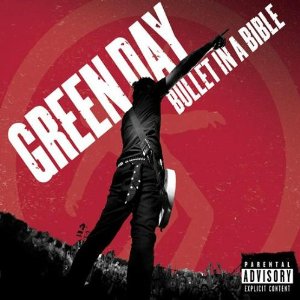Album Review: Bullet in a Bible

February 14, 2016
Green Day is one of those unique bands that, for the better part of their existence, has had two impactful moments more than a decade apart from each other. Ten years after their landmark album Dookie, Green Day came back in style with the rock opera American Idiot (2004). A little over a year after American Idiot’s release, the band put out Bullet in a Bible, their first studio album. Filled with American Idiot staples and hits from their earlier albums, Bullet in a Bible meshes older Green Day with mid-21st century Green Day.
The first chunk of songs are from American Idiot; a less powerful version of the aforementioned album’s title track followed by a riveting “Jesus of Suburbia” performance start the record off. Then there’s “Holiday,” whose guitar solo is made more bland by the lack of studio patching – luckily the break in the middle of the song between B.J. Armstrong and the crowd make the track worthwhile. Following “Are We the Waiting” comes one of the more aggressive performances on Bullet in a Bible – “St. Jimmy.” Green Day has never been too complex with their songs, but in their simplicity comes that energetic, powerful echo of punk that first brought them into the spotlight – “St. Jimmy” is the embodiment of this trademark.
After “St. Jimmy” the band delves into their past, going from their Dookie (1994) days all the way up to Warning (2000). Each blast-from-the-past is superb in its own, almost better than the American Idiot renditions – whether that’s for better or worse, it’s unclear. In particular, the eight minute-long “King for a Day/Shout” is a pleasant mixture of an often-overlooked Nimrod (1997) track and an Isley Brothers cover that really gets the crowd (and likely the listener[s]) engaged. The band wraps up the performance with two American Idiot tracks and two older classics. A powerful rendition of “Wake Me Up When September Ends” and equally fantastic “Boulevard of Broken Dreams” are unfortunately mundane because of the “over-played hit” status of both tracks. Surprisingly, both songs are wholly trumped by “Good Riddance (Time of Your Life),” which concludes Bullet in a Bible.
The album itself is a solid live album. While there’s little to be missed from hearing Green Day live, what little that is worth listening to is quite worth the time. Perhaps the most disappointing feature was the exclusion of some of American Idiot’s lesser-known tracks (e.g. “Letterbomb,” “Whatsername”). While this is a live performance, and like any live performance it is dominated by hit songs, it still would’ve been nice to hear a few unexpected tracks. Nevertheless, as a Green Day fan, this album should not be overlooked. From a critical perspective, you might find another side of the band from experiencing Bullet in a Bible.
Mr. McCrystal • Feb 14, 2016 at 3:04 pm
Still one of my favorite bands. I got to see them live in 2005 while they were on the American Idiot tour. Thanks for the piece, Charlie.